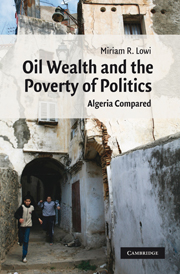8 - Conclusions: oil wealth and the poverty of politics
Published online by Cambridge University Press: 29 March 2010
Summary
Some final thoughts on Algeria
Having come full circle, how does the analytical framework employed in this book help make sense of Algeria's auspicious beginnings, acute social conflicts in the 1980s, a bloody and interminable civil war, and the fairly spectacular resurgence of the state in the late 1990s? Why did the domestic political economy unravel, and how did the regime manage to retain power and neutralize its opposition more or less successfully? And what does the Algerian experience teach us about the durability of patrimonial systems, the contingency of oil, as well as the integrated roles of structures and actor choice in political outcomes in oil-exporting states? What mechanisms have allowed the institutional arrangements that emerged out of the critical junctures in Algeria to sustain themselves over time such that the system reproduces itself and persists, rather than succumbs to hostile social forces?
In pondering the Algerian experience, one could argue that a profound contradiction lies at the heart of the country's political development. The leadership, in its efforts at fashioning a nation and as part of the post-independence developmentalist agenda, espoused an ideology and rhetoric of popular incorporation, and implemented policies – such as heavy industrialization, arabization, and the distribution of abandoned colonial property – that it insisted were inclusive in nature. However, not only did those policies fail to achieve their stated goals, but they were, in practice, highly exclusionary.
- Type
- Chapter
- Information
- Oil Wealth and the Poverty of PoliticsAlgeria Compared, pp. 177 - 191Publisher: Cambridge University PressPrint publication year: 2009

